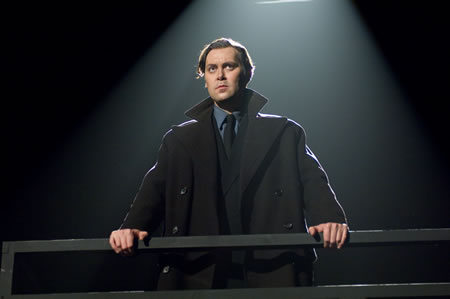

Christian McKay as Orson Welles onstage in a performance of Julius Caesar in Me and Orson Welles.
Photo: Liam Daniel.
The character of Orson Welles dominates the film, Me and Orson Welles. Welles was a young artistic genius. Actor, stage director, film director and radio star. By the age of thirty he had achieved fame and notoriety in the media world of 1930s New York and Hollywood. Always experimental, always pushing his chosen medium in new directions, Welles exemplifies the artistic experimentation associated with the inter-war years.
Welles’ production of Julius Caesar at the Mercury Theatre in New York in 1937 caused a sensation when it opened. Me and Orson Welles shows the process of putting on the play, from rehearsals, stage design and the overall vision that Welles had for his production, through rehearsals and on to the first night. This process is not without its problems and disputes and the film gives an insight into this process of direction – at least of one director’s process.
Orson Welles' 1937 production of Julius Caesar was groundbreaking because it took an Elizabethan play and, through its production values, made it relevant to the time in which it was performed. Welles’ setting of the play in a totalitarian state must have had tremendous resonance in a world where the rise of fascism was propelling the world towards war. Welles, one could say, adapted the play to suit his own vision, cutting the text, reordering scenes in order to achieve his purpose in exploring the nature of dictatorship.
© CinemaNX Films One Ltd 2009.